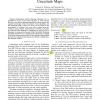Free Online Productivity Tools
i2Speak
i2Symbol
i2OCR
iTex2Img
iWeb2Print
iWeb2Shot
i2Type
iPdf2Split
iPdf2Merge
i2Bopomofo
i2Arabic
i2Style
i2Image
i2PDF
iLatex2Rtf
Sci2ools
138
click to vote
ICRA
2006
IEEE
2006
IEEE
Adapting Probabilistic Roadmaps to Handle Uncertain Maps
Abstract— Randomized motion planning techniques are responsible for many of the recent successes in robot control. However, most motion planning algorithms assume perfect and complete knowledge of the environment. These algorithms can fail arbitrarily badly if there are errors in the model of the environment. In contrast, real world robot systems have succeeded by using explicit representations of model uncertainty in localization and mapping to compensate for sensor error. In this paper, we propose an extension of the Probabilistic Roadmap algorithm that allows us to compute motion plans that are robust to uncertain environment models. We show that the adapted PRM generates less collision-prone trajectories with fewer samples than the standard method.
Related Content
| Added | 11 Jun 2010 |
| Updated | 11 Jun 2010 |
| Type | Conference |
| Year | 2006 |
| Where | ICRA |
| Authors | Patrycja E. Missiuro, Nicholas Roy |
Comments (0)

